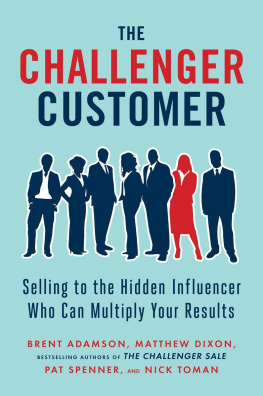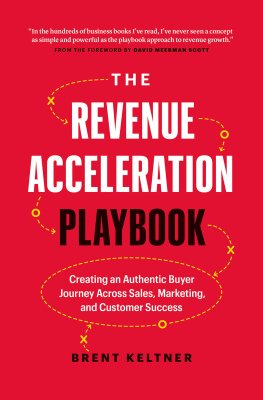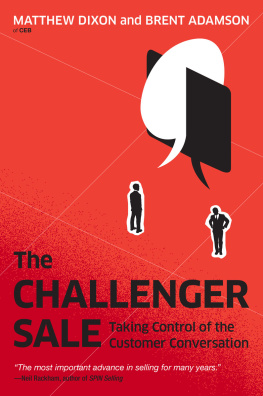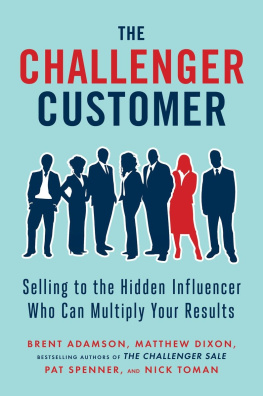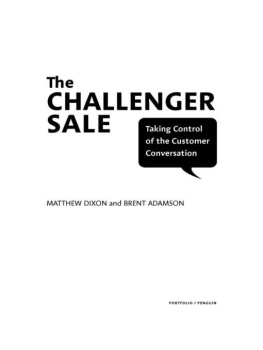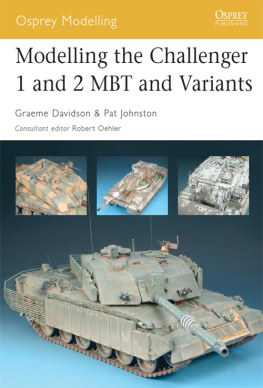Brent Adamson - The Challenger Customer
Here you can read online Brent Adamson - The Challenger Customer full text of the book (entire story) in english for free. Download pdf and epub, get meaning, cover and reviews about this ebook. year: 2015, publisher: PORTFOLIO / PENGUIN, genre: Business. Description of the work, (preface) as well as reviews are available. Best literature library LitArk.com created for fans of good reading and offers a wide selection of genres:
Romance novel
Science fiction
Adventure
Detective
Science
History
Home and family
Prose
Art
Politics
Computer
Non-fiction
Religion
Business
Children
Humor
Choose a favorite category and find really read worthwhile books. Enjoy immersion in the world of imagination, feel the emotions of the characters or learn something new for yourself, make an fascinating discovery.
- Book:The Challenger Customer
- Author:
- Publisher:PORTFOLIO / PENGUIN
- Genre:
- Year:2015
- Rating:4 / 5
- Favourites:Add to favourites
- Your mark:
- 80
- 1
- 2
- 3
- 4
- 5
The Challenger Customer: summary, description and annotation
We offer to read an annotation, description, summary or preface (depends on what the author of the book "The Challenger Customer" wrote himself). If you haven't found the necessary information about the book — write in the comments, we will try to find it.
The Challenger Customer — read online for free the complete book (whole text) full work
Below is the text of the book, divided by pages. System saving the place of the last page read, allows you to conveniently read the book "The Challenger Customer" online for free, without having to search again every time where you left off. Put a bookmark, and you can go to the page where you finished reading at any time.
Font size:
Interval:
Bookmark:


PORTFOLIO / PENGUIN
An imprint of Penguin Random House LLC
375 Hudson Street
New York, New York 10014
penguin.com
Copyright 2015 by CEB. All rights reserved.
Penguin supports copyright. Copyright fuels creativity, encourages diverse voices, promotes free speech, and creates a vibrant culture. Thank you for buying an authorized edition of this book and for complying with copyright laws by not reproducing, scanning, or distributing any part of it in any form without permission. You are supporting writers and allowing Penguin to continue to publish books for every reader.
ISBN 978-0-698-40618-6
Version_1
To the members of CEB around the world, who challenge us every day to deliver insights worthy of their time and attention
The odd combination of where I live and what I do for a living have turned me into a bit of a walking punch line over the past decade or so.
Let me explain.
I live in the Greater Washington, D.C., metropolitan areathe seat of the U.S. governmentand I run one of the worlds most widely used sources of insight into corporate performance. So several hundred times a year in cities around the world, I introduce myself by saying Im here from Washington, D.C., to share some insights about best management practices.
Business cultures differ widely across regions and nations, so the response to this statement runs the gamut from Youve got to be sh*&%ng me (Silicon Valley, Amsterdam) to Im sorry, I think I misheard you (Singapore, Minneapolis) to Ah, youll feel at home here after a glass of wine. Try the Super Tuscan (Rome). While the tone of responses varies, no one misses the irony at the heart of the statement. Like many national capitals, Washington has become a byword for organizational dysfunction. This is largely because citizens believe the U.S. Congress and similar deliberative legislative bodies that seem to take forever to act are useless, especially since when they do act they achieve only modestif anyresults.
All around the world, I routinely hear how much better off wed be if only government would run itself like a business. The unfortunate truth is thatin many respectsit already does.
More specifically, business is increasingly running itself like a dysfunctional legislative body.
I THOUGHT THIS BOOK WAS ABOUT SALES AND MARKETING?
Youre now thinking that youve picked up the wrong book, but the headline of our recent work on sales, marketing, and the buying process suggests that in most B2B commercial environments purchasing looks a lot like a bickering Congress or Parliament on a bad day.
Thats why weve done a deep dive into the modern companys buying process. As we started comparing notes across companies and industries, we realized that the stories commercial leaders were sharing were eerily similar to our own experiencesparticularly when we were working with leaders to engineer dramatic innovations or step-function improvements in outcomes.
As the research teams work continued, my own mind kept going back to a conversation I had with the controller of a German multinational who was using our work to radically simplify and accelerate information flow through his company. I visited on a day when the projects kickoff (and ultimate ROI) had been delayed by three months due to a last-minute review requested by something called the excellence assurance center of excellence (that is not a typo).
The controller was in what could (charitably) be called a foul mood. The project itself was slated to last only six months, and he had enthusiastic support from the CEO and partnership from the CIO and head of HR. In terms of large-scale change management, he had really done everything right. And yetat the eleventh hour, out of nowherea new stakeholder arrived on the scene, slowing down and lowering the aspiration of this fast-moving and ambitious effort. Leaning back in his chair, the CFO moaned, I didnt even know we had an excellence assurance COE.
He got up, walked toward the window, and said, This is a total [long German word that definitely didnt mean Really great day for our company: I just couldnt be prouder to work here!].
And it wasnt a great day. Nor, by the end, was it a great project. By the time the COE review was complete, the project was rescoped twice, suffered three delays, and ultimately delivered a fourth of the original business value.
When I shared this story with an HR chief of a major conglomerate, she remarked, Thats ridiculous. I nodded, thinking she was going to share a story about how decisive she and her C-suite peers were relative to this poor controllers company. She continued, laughing. I once lost two months to our firms project-naming committee. He should be happy with that outcome.
THE NEW REALITY FOR SALES: BIG, COMPLEX PROCESSES AND BIG, GERMAN CURSE WORDS
If its this difficult for a C-level executive to drive change through an organization, just imagine how hard it is for someone on the outside to galvanize support for a disruptive new solution. The data that we analyzed points to purchase processes characterized by an ever-expanding array of stakeholders with often competing agendas, changing purchase criteria, andmost troublinga reversion to lowest-common-denominator behaviors.
Why?
We see this behavior as part of a broader trend in corporate operations. Several factors are reshaping how companies operate and make decisions, and all of them have implications for sales and marketing.
First, simply put, big companies are just bigger. The smallest Fortune 500 company is many times the size of the smallest one just twenty years ago. And with big size comes big complexity.
Information flows are multiplying quickly. While this means more educated buyers, it also means more people in the processeach with access to competing information and each empowered to form (and share) opinions. At its worst, information overflow can lead to complete decision paralysisbad for companies and bad for the suppliers trying to engage with them.
Professional and control functions are strengthening within companies, with many having a say in virtually every decision. This is driven partly as a result of the need for scale and consistency across larger entities and partly because of concerns about risk and regulation. Obviously from a commercial perspective, the most important of these is procurement, but procurement is only one of the folks invited to the partycompliance, data privacy, IT security, EH&S, and quality often all weigh in on major buying decisions.
Emphasis on collaborative decision making is increasing in an attempt to reap the benefits of diverse perspectives on business issues.
None of these things are bad. In fact, all are undeniably goodbigger opportunities, more information, professional and analytic participants, and collaboration among different parties all ought to strengthen buying dynamics and make the process more likely to yield a successful purchase.
But all too often they dont. Different functions bring different agendas to the table. Excessive collaboration adds time (but not value) to the process. Information abundance buries the core issues; opportunities that initially combined strategic advantage for the buyer with strategic opportunity for the seller get watered down or abandoned altogether. In the end, if any deal is reached, its for less scope and impact than what was initially proposed.
Font size:
Interval:
Bookmark:
Similar books «The Challenger Customer»
Look at similar books to The Challenger Customer. We have selected literature similar in name and meaning in the hope of providing readers with more options to find new, interesting, not yet read works.
Discussion, reviews of the book The Challenger Customer and just readers' own opinions. Leave your comments, write what you think about the work, its meaning or the main characters. Specify what exactly you liked and what you didn't like, and why you think so.

